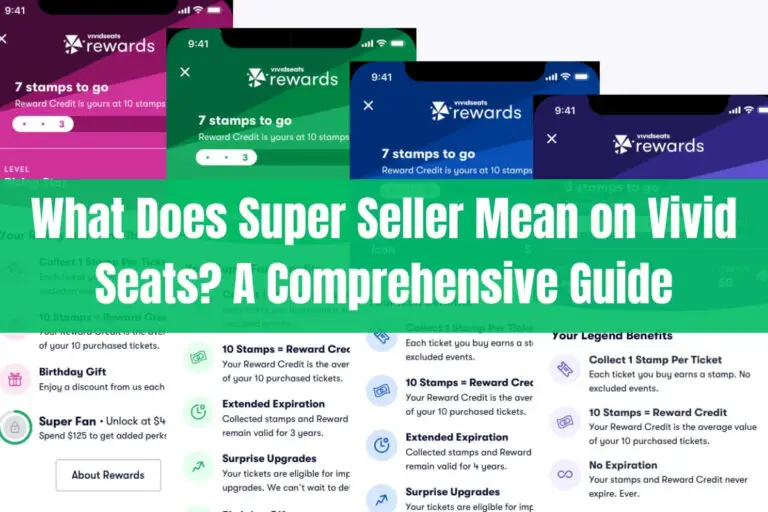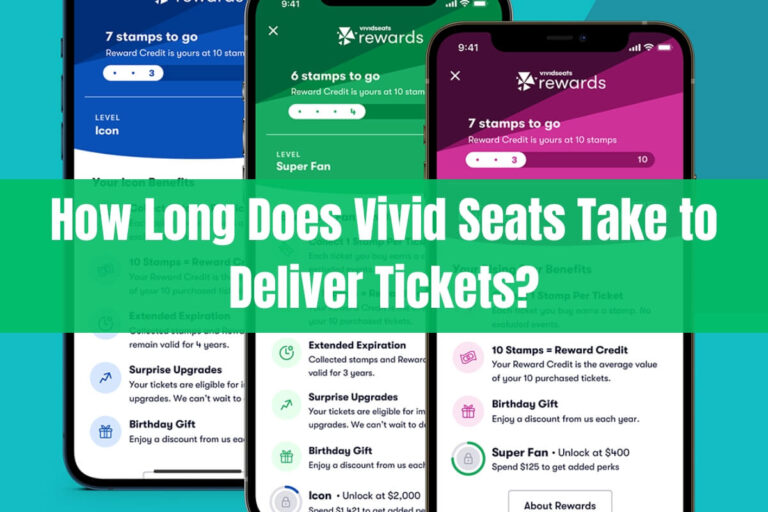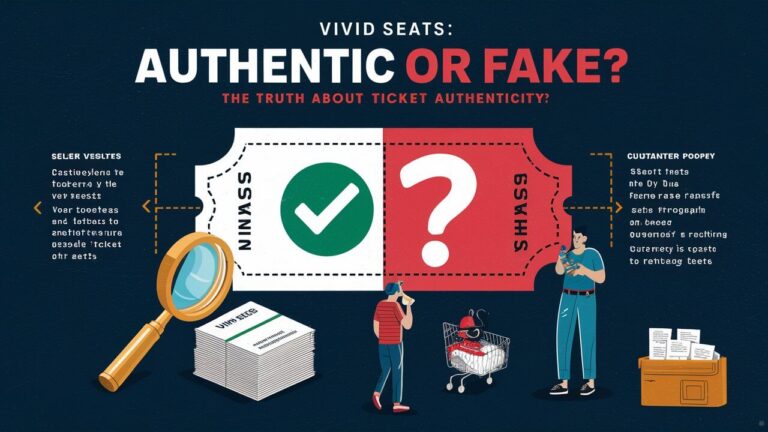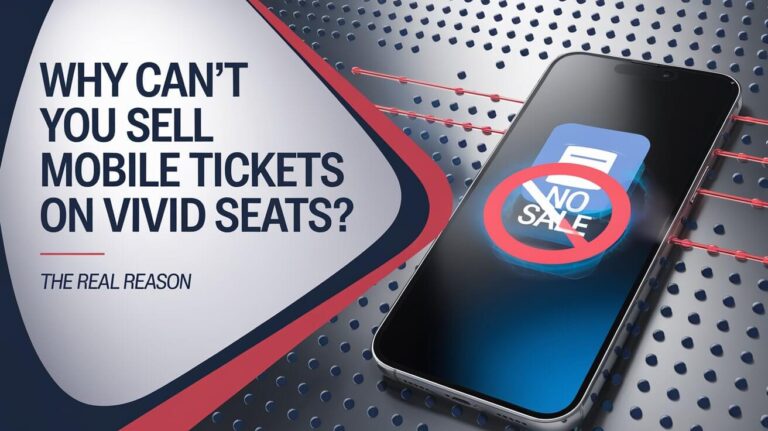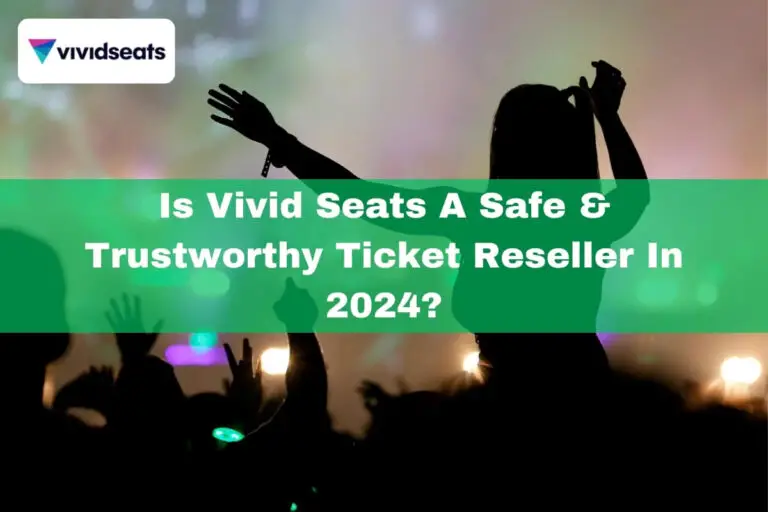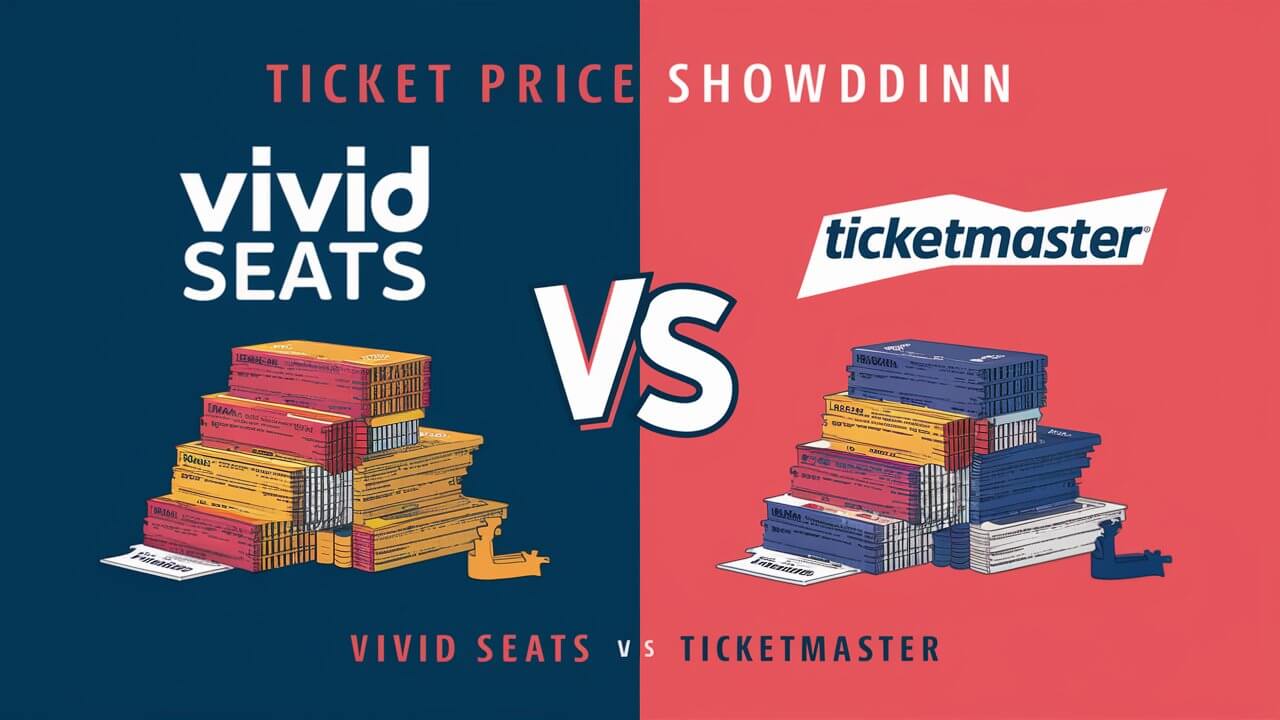
Buying tickets for your favorite events can be tricky. You want the best seats at the best prices. Often, you’ll find yourself comparing ticket prices on different platforms. Two big names that pop up are Vivid Seats and Ticketmaster. But here’s something interesting: Vivid Seats often offers cheaper tickets than Ticketmaster. Why? Let’s dive into the reasons behind this price difference.
Vivid Seats can be cheaper due to its resale marketplace model, different fee structures, and dynamic pricing algorithms. These factors, combined with supply and demand dynamics, often result in lower prices compared to Ticketmaster’s primary market offerings.
In this post, we’ll explore:
- The key differences between Vivid Seats and Ticketmaster
- How their pricing models work
- The impact of the secondary market on ticket prices
- Fee structures and their effect on final costs
- Strategies to find the best deals on both platforms
Let’s get started and unravel the mystery of ticket pricing!
Understanding Vivid Seats and Ticketmaster
What is Vivid Seats?
Vivid Seats is an online ticket marketplace. It’s where fans can buy and sell tickets for all sorts of events. Think concerts, sports games, and theater shows. The company started in 2001 and has grown into a major player in the ticket resale game.
Key points about Vivid Seats:
- It’s a secondary market platform
- Allows individuals and brokers to resell tickets
- Offers a wide range of events
- Known for competitive pricing
What is Ticketmaster?
Ticketmaster, on the other hand, is a ticketing giant. It’s been around since 1976 and is often the primary ticket seller for many events. This means they work directly with venues and event organizers to sell tickets.
Ticketmaster’s main features:
- Primary ticket seller for many events
- Partners with major venues and artists
- Offers both primary and resale tickets
- Uses dynamic pricing for some events
Key Differences Between the Two Platforms
The main difference? Vivid Seats is primarily a resale marketplace, while Ticketmaster is often the original ticket seller. This fundamental difference is a big factor in why their prices vary so much.
Other differences include:
- How do they source tickets
- Their relationships with venues and artists
- Fee structures
- Pricing strategies
These differences set the stage for understanding why Vivid Seats can often offer cheaper tickets than Ticketmaster.
Pricing Models: Vivid Seats vs Ticketmaster
How Vivid Seats Determines Ticket Prices
Vivid Seats doesn’t set the initial ticket prices. Instead, sellers on the platform decide how much to charge. This leads to a wide range of prices for the same event.
Factors influencing Vivid Seats prices:
- What sellers paid for the tickets
- Current demand for the event
- How close the event date is
- Competition from other sellers
Ticketmaster’s Pricing Structure
Ticketmaster’s pricing is more complex. As a primary seller, they often set initial prices based on agreements with artists and venues.
Ticketmaster’s pricing factors:
- Face value set by the event organizer
- Dynamic pricing for high-demand events
- Platinum and VIP ticket options
- Resale market prices (for their resale platform)
Factors Influencing Price Differences
Several factors can make Vivid Seats cheaper:
- Competition among resellers
- Last-minute price drops
- Lower overhead costs
- Flexible pricing not tied to original face value
These factors often lead to more competitive prices on Vivid Seats, especially as the event date approaches.
The Secondary Market Advantage
Vivid Seats as a Resale Marketplace
Vivid Seats thrives in the secondary ticket market. This market includes tickets being resold by individuals or brokers who bought them earlier.
Benefits of the secondary market:
- More pricing flexibility
- Ability to react quickly to demand changes
- Opportunity for both higher and lower prices
How Resale Affects Ticket Prices
Resale can drive prices both up and down. For high-demand events, prices might skyrocket. However, for others, they can drop significantly.
Reasons for lower resale prices:
- Sellers looking to recoup some money for tickets they can’t use
- Brokers trying to offload unsold inventory
- Decreased demand closer to the event date
Ticketmaster’s Approach to Resale
Ticketmaster has its resale platform. But it’s just one part of their business, not their main focus.
Ticketmaster’s resale features:
- Verified resale tickets
- Price floors to protect against extreme undercutting
- Integration with their primary ticket sales
This approach can keep prices higher on Ticketmaster, even for resale tickets.
Fee Structures Compared
Vivid Seats’ Fee Breakdown
Vivid Seats charges fees to both buyers and sellers. These fees are a key part of their business model.
Typical Vivid Seats fees:
- Service fee (for buyers)
- Delivery fee (if applicable)
- Seller’s fee (percentage of the sale price)
Ticketmaster’s Fee System
Ticketmaster’s fees can vary widely depending on the event and ticket type.
Common Ticketmaster fees:
- Service fee
- Facility charge
- Order processing fee
- Delivery fee
Impact of Fees on Final Ticket Prices
Fees can significantly affect the final price you pay. Often, Vivid Seats’ total fees are lower than Ticketmaster’s.
Why Vivid Seats’ fees might be lower:
- More competitive marketplace
- Lower operating costs
- Incentive to keep total prices attractive to buyers
This fee difference is another reason why Vivid Seats can be cheaper overall.
Supply and Demand Dynamics
How Supply Affects Prices on Vivid Seats
Supply on Vivid Seats can fluctuate a lot. More supply often means lower prices.
Factors affecting supply:
- Number of sellers listing tickets
- How many tickets each seller has
- Timing of listings (early vs. last-minute)
Ticketmaster’s Inventory Management
Ticketmaster carefully manages its ticket inventory. They often release tickets in phases and hold some back.
Ticketmaster’s inventory strategies:
- Staggered ticket releases
- Holding tickets for fan clubs or presales
- Adjusting prices based on demand
Event Popularity and Price Fluctuations
Popular events behave differently on each platform. On Vivid Seats, prices might spike initially but can drop as the event nears. Ticketmasters tend to keep prices steady or increase them for high-demand shows.
How popularity affects prices:
- Initial price surges on both platforms
- Potential for last-minute deals on Vivid Seats
- Sustained high prices on Ticketmaster for popular events
Understanding these dynamics can help you time your purchase for the best deal.
Technology and Algorithms
Vivid Seats’ Pricing Algorithms
Vivid Seats uses smart algorithms to help sellers price their tickets. These algorithms consider many factors to suggest competitive prices.
What Vivid Seats’ algorithms consider:
- Historical sales data
- Current market trends
- Event Popularity
- Time until the event
Ticketmaster’s Dynamic Pricing
Ticketmaster uses dynamic pricing for many events. This means prices can change based on demand.
How Ticketmaster’s dynamic pricing works:
- Adjusts prices in real-time
- This can lead to higher prices for popular events
- Aims to match market value
How Technology Influences Ticket Costs
Both platforms use technology to optimize prices. But their goals differ. Vivid Seats aims for competitive pricing to attract buyers. Ticketmasters often focus on maximizing revenue for artists and venues.
Technology’s impact on pricing:
- More responsive pricing on both platforms
- Potential for better deals on Vivid Seats due to competition
- Higher prices on Ticketmaster for in-demand events
This technological approach often results in Vivid Seats offering cheaper options.
Consumer Strategies for Finding Cheaper Tickets
Best Times to Buy on Vivid Seats
Timing can be crucial when buying on Vivid Seats. Prices often fluctuate as the event date approaches.
Tips for timing your Vivid Seats purchase:
- Check prices regularly
- Consider buying last-minute for potential deals
- Be ready to buy if you see a good price
Tips for Scoring Deals on Ticketmaster
While Ticketmaster prices are often higher, there are still ways to find good deals.
Strategies for Ticketmaster savings:
- Look for presale opportunities
- Check for promotional codes
- Consider less popular show dates
Comparing Prices Across Platforms
Don’t settle for the first price you see. Compare options on both platforms before buying.
Steps for effective comparison:
- Check both sites for the same event
- Factor in all fees
- Consider seat locations carefully
- Look at both platforms’ guarantees
By comparing thoroughly, you can often find cheaper options on Vivid Seats.
Risks and Guarantees
Vivid Seats’ Buyer Protection Policies
Buying resale tickets comes with some risks. Vivid Seats offers protections to address these concerns.
Vivid Seats guarantees:
- 100% buyer guarantee
- Refunds for canceled events
- Comparable or better replacements if issues arise
Ticketmaster’s Guarantees
As a primary seller, Ticketmaster’s guarantees are straightforward.
Ticketmaster’s assurances:
- Guaranteed valid tickets
- Refunds for canceled events
- Customer service support
Weighing Lower Prices Against Potential Risks
When choosing between cheaper tickets on Vivid Seats and potentially more expensive ones on Ticketmaster, consider the risks.
Factors to weigh:
- Price difference
- Importance of the event to you
- Your comfort level with resale markets
- Each platform’s guarantee policies
Often, the savings on Vivid Seats outweigh the slightly higher risk.
The Impact of Exclusivity Deals
Ticketmaster’s Partnerships with Venues and Artists
Ticketmaster has exclusive deals with many venues and artists. This can affect ticket availability and pricing.
Effects of Ticketmaster’s partnerships:
- Control over initial ticket sales
- Ability to set starting prices
- Limited competition in the primary market
How These Deals Affect Pricing
These exclusive arrangements often lead to higher prices on Ticketmaster. They have less pressure to compete on price.
Pricing impacts:
- Higher face values for tickets
- Less incentive for discounts
- Control over resale through official channels
Vivid Seats’ Approach to Exclusive Events
Vivid Seats operates differently. They rely on resellers who have acquired tickets through various means.
Vivid Seats’ strategy for exclusive events:
- Offering a marketplace for any ticket, regardless of origin
- Allowing market forces to drive prices
- Providing options even for “sold out” shows
This approach often results in more varied pricing, including cheaper options.
Future Trends in Ticket Pricing
Emerging Technologies in the Ticketing Industry
The ticket industry is always evolving. New technologies are shaping how we buy and sell tickets.
Upcoming trends:
- Blockchain for ticket verification
- AI-powered pricing models
- Virtual and augmented reality experiences
Potential Changes in Pricing Models
Both Vivid Seats and Ticketmaster may adapt their pricing strategies in the future.
Possible future changes:
- More transparent fee structures
- Increased use of dynamic pricing
- Integration of primary and secondary markets
The Future of Vivid Seats and Ticketmaster
As the industry evolves, both platforms will likely change too. But their core differences may persist.
Predictions for the future:
- Continued competition between primary and secondary markets
- More focus on mobile and digital ticketing
- Increased efforts to combat scalping and fraud
These changes could affect pricing strategies, potentially maintaining Vivid Seats’ tendency to offer cheaper options.
Conclusion
We’ve explored the many reasons why Vivid Seats often offers cheaper tickets than Ticketmaster. From its resale marketplace model to different fee structures and dynamic pricing algorithms, Vivid Seats frequently provides more competitive prices.
Key takeaways:
- Vivid Seats’ secondary market allows for more price flexibility
- Different fee structures often result in lower total costs on Vivid Seats
- Ticketmaster’s primary seller status and exclusive deals can lead to higher prices
- Both platforms use technology to optimize pricing, but with different goals
- Careful comparison and timing can help you find the best deals
Remember, while Vivid Seats is often cheaper, it’s always worth comparing prices on both platforms. Consider factors like guarantees, seat locations, and your comfort with resale markets when making your decision.
By understanding how these platforms work and why their prices differ, you’re now better equipped to find the best deals for your next event. Happy ticket hunting!

